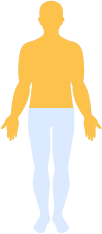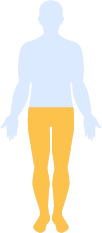Bilateral Spastic Cerebral Palsy, Spastic Quadriplegia and Spastic Diplegia
Bilateral spastic Cerebral Palsy – including diplegia and quadriplegia – is by far the most common form of CP. Roughly three-quarters of all cases of Cerebral Palsy fall into this category. Tightness and stiffness of the muscles are the signature symptoms of this form of Cerebral Palsy. Diplegia affects mainly the legs, while quadriplegia affects the upper and lower halves of the body, often including the face.
- Constant hypertonia (stiffness or rigidity) in the muscles of the legs, hips and pelvis
- Little or no muscular stiffness or rigidity in the arms and the rest of the upper body
- “Scissor gait” characterized by the legs turning inward, pulling together and crossing at the knees
- Difficulty walking
- Impaired balance

- Constant hypertonia (stiffness or rigidity) in the muscles of the legs, hips and pelvis
- Little or no muscular stiffness or rigidity in the arms and the rest of the upper body
- “Scissor gait” characterized by the legs turning inward, pulling together and crossing at the knees
- Difficulty walking
- Impaired balance


In bilateral spastic Cerebral Palsy, the brain damage centers on the motor cortex, the basal ganglia and the corticospinal tract. This prevents the muscles from properly absorbing the amino acid that governs muscle tone.
Some of the most common causes of this type of brain damage include:
- Oxygen deprivation during labor and delivery
- Bleeding in the brain
- Abnormal brain development
- Fetal stroke
- Infection
- Jaundice
- High blood pressure in the mother
- Malformed blood vessels
Some potentially effective treatments include:
 Physical therapy
Physical therapy Occupational therapy
Occupational therapy Speech therapy
Speech therapy Medications including baclofen (a pharmaceutical replacement for a gamma amino butyric acid), tizanidine and Botox (muscle relaxants), phenol (nerve deadener)
Medications including baclofen (a pharmaceutical replacement for a gamma amino butyric acid), tizanidine and Botox (muscle relaxants), phenol (nerve deadener) Surgery to sever nerves that are overly active
Surgery to sever nerves that are overly active Surgery to release contracted muscles
Surgery to release contracted musclesSince every case of diplegic or quadriplegic bilateral spastic CP is unique – as is every patient – the particular course of treatment will vary. The degree of success of any particular treatment also depends to a large degree on the individual characteristics of the condition and the child.
- Extrapyramidal or non-spastic Cerebral Palsy
- Ataxic Cerebral Palsy
- Dyskinetic Cerebral Palsy
- Dystonic Cerebral Palsy
- Chorea
- Choreoathetoid
- Dystonia
- Unilateral Cerebral Palsy
- Ataxic Cerebral Palsy
- Mixed Cerebral Palsy
- Athetoid Cerebral Palsy (Dyskinetic Cerebral Palsy)
MyChild™ offers free case evaluations and answers to your questions about your child’s bilateral CP. Fill out our online contact form now for confidential and caring assistance.







